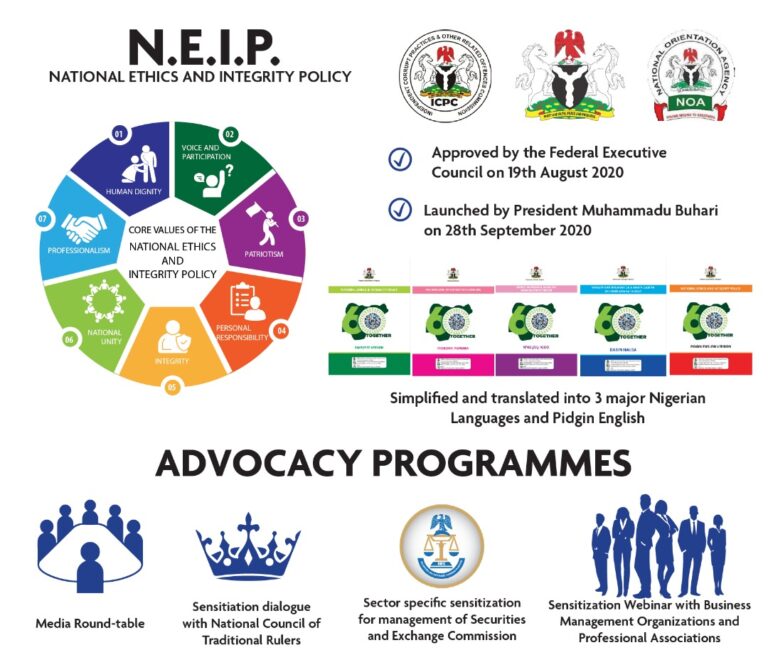National Ethics and Integrity Policy (NEIP)
INTRODUCTION
The National Ethics and Integrity Policy was developed by the Independent Corrupt Practices and Other Related Offences Commission (ICPC) in collaboration with the Office of the Secretary to the Government of the Federation (OSGF) and the National Orientation Agency (NOA) in response to the many damaging effects of corruption in both the public and private sectors.
The policy was approved by the Federal Executive Council (FEC) on 19th August 2020 and launched by President Muhammadu Buhari on 28th September 2020 during the 2nd National Summit on Diminishing Corruption in the Public Sector to celebrate ICPC’s 20th anniversary.
ICPC had earlier developed a National Values Curriculum for the teaching of values in schools to young Nigerians. This National Ethics and Integrity Policy builds on the basics of that curriculum, to entrench positive values in the society.
LEGAL FRAMEWORK FOR THE POLICY
This Policy draws its contents from:
- The Constitution of the Federal Republic of Nigeria 1999 as amended,
- The Corrupt Practices and Other Related Offences Act, 2000,
- National Orientation Act, Cap N64 LFN 2004,
- United Nations Convention Against Corruption (UNCAC) and other relevant laws.
- The Policy further contains inputs from the cultural and religious values of Nigeria’s peoples as well as the codes of professional associations.
FUNDAMENTAL PRINCIPLES OF THE POLICY
The Policy obligates all Nigerians, and everyone who resides within the borders of Nigeria or who relates with the country in one form or the other, to commit to uphold the following core values of Human Dignity, Voice and Participation, Patriotism, Personal Responsibility, Integrity, National Unity and Professionalism.
The violation of any of these principles is actionable by relevant government agencies both at the federal and state levels.
The principles of the Policy are to be interpreted in line with provisions of federal laws and regulations, the Nigerian Constitution, standing rules and codes of conduct of professional bodies and statutory rules guiding public and private institutions.
PURPOSE OF THE POLICY
The Policy was developed with a view to help restore and revitalize the public and private sectors, while enhancing values and integrity, and tackling corruption in the larger Nigerian society. Specifically, the policy was designed to:
- Strengthen efforts at positive national transformation, as citizens and those who relate with Nigeria imbibe and embody the core values.
- Help the country reach national development goals as the meaning of national purpose is reframed.
- Save the country from the ongoing erosion of ethics and collapse of values.
- Encourage citizens to put Nigeria above all else. It will help diminish the need for “corruption as a survival strategy” and “enhance the survival of the weak” while controlling “the power of the strong”.
- Open up an ongoing dialogue as to how to refine behaviours to bring out the best in Nigerians.
CORE VALUES OF THE POLICY

BRIEF ON THE SEVEN CORE VALUES:
- Human Dignity: The Policy recognizes that human beings have inherent worth that must be respected and never violated.
- Voice and Participation: Voice refers to the right to express an opinion and influence a decision, while Participation is an act of taking part in an activity or event. The Policy encourages people’s right to voice and participation.
- Patriotism: Patriotism means love for one’s country and the willingness to defend it. It inspires a sense of belonging and nationhood, loyalty, solidarity, national pride, respect, tolerance, dedication, etc.
- Personal Responsibility: This implies a sense of duty to help provide solutions within a group. Nigerians are expected to display personal responsibility always.
- Integrity: To act with Integrity means to act with consistency with established standards, principles, expectations and values regulating a particular undertaking, as well as to one’s declared principles. Integrity entails doing the right thing and doing things right consistently.
- National Unity: National unity means having a sense of oneness as Nigeria as a nation, of belonging to a nation where all citizens are equal regardless of tribe or origin.
- Professionalism: This refers to the high standards expected from a person who is well trained in a particular job. It refers to commitment to excellence in service, adherence to established standards and regulations related to a profession.
IMPLEMENTATION OF THE POLICY
The implementation of the Policy is planned to be in phases which include:
- Stakeholder engagement (which has already commenced with the engagement of traditional rulers under the platform of the National Council of Traditional Rulers of Nigeria, and some Private Sector groups).
- Implementing the Action Plan and Consequence Management Template across the stakeholder groups.
- Stepping down Policy to sub-national levels – states and local government (already ongoing with Zonal Dialogues on the Policy which is taking place nationwide).
- Periodic Review, Monitoring and Evaluation
ENFORCEMENT OF SANCTIONS AND PENALTIES
The Independent Corrupt Practices and Other Related Offences Commission or other law enforcement agencies can sanction or prosecute anyone who goes against the principles and values in this National Ethics and Integrity Policy or fails to implement its directives. The Policy can also be used by anyone to seek justice.
SUSTAINABILITY
The public and private sectors at the federal, state and local government levels are all encouraged to adopt the Policy and its principles. This Policy shall also be used in negotiating procurement, trade, socio-economic, cultural/creative industry agreements, etc.
CO-ORDINATION
The implementation of this policy will be coordinated by OSGF, ICPC and NOA supported by all Ministries, departments and agencies as well as institutions at the state and local government levels.
CONCLUSION
The development of the National Ethics and Integrity Policy by ICPC with its partners, and its subsequent approval for implementation represents a significant milestone in Nigeria’s quest for a national rebirth that will introduce accountability and transparency in governance.
It should also recondition its citizens to work for national development; while encouraging them to cultivate respect and love for fellow citizens.
With this policy in operation, selfishness, violence, disunity and ineffective governance would be things of the past for Nigeria to take its pride of place in the comity of nations.


